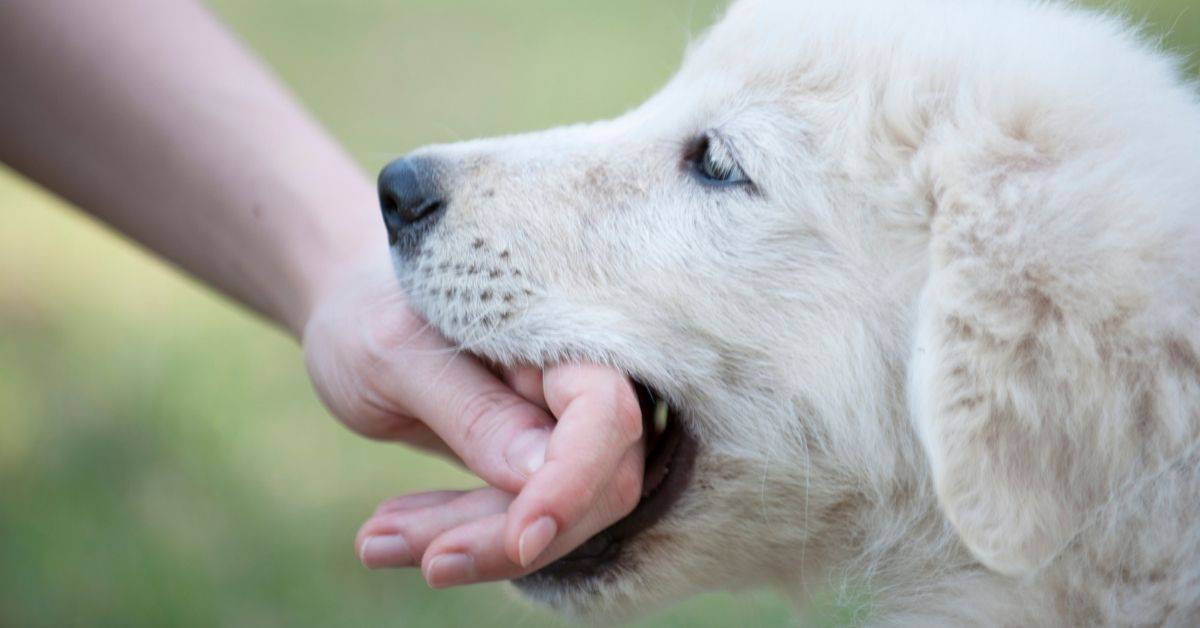Do you ask yourself, “How to stop my dog from biting when excited?”.
This behavior can be dangerous, and it’s essential to stop your dog from biting when excited.
In this article, we will discuss 13 ways to stop your dog from biting when excited.
Each of these methods has been proven effective, so try the ones that seem most appropriate for your situation.
Remember that it may take some time for your dog to respond positively to these methods, but with patience and persistence, you can stop your dog from biting when excited!
Effective Ways To Stop A Dog From Biting When Excited
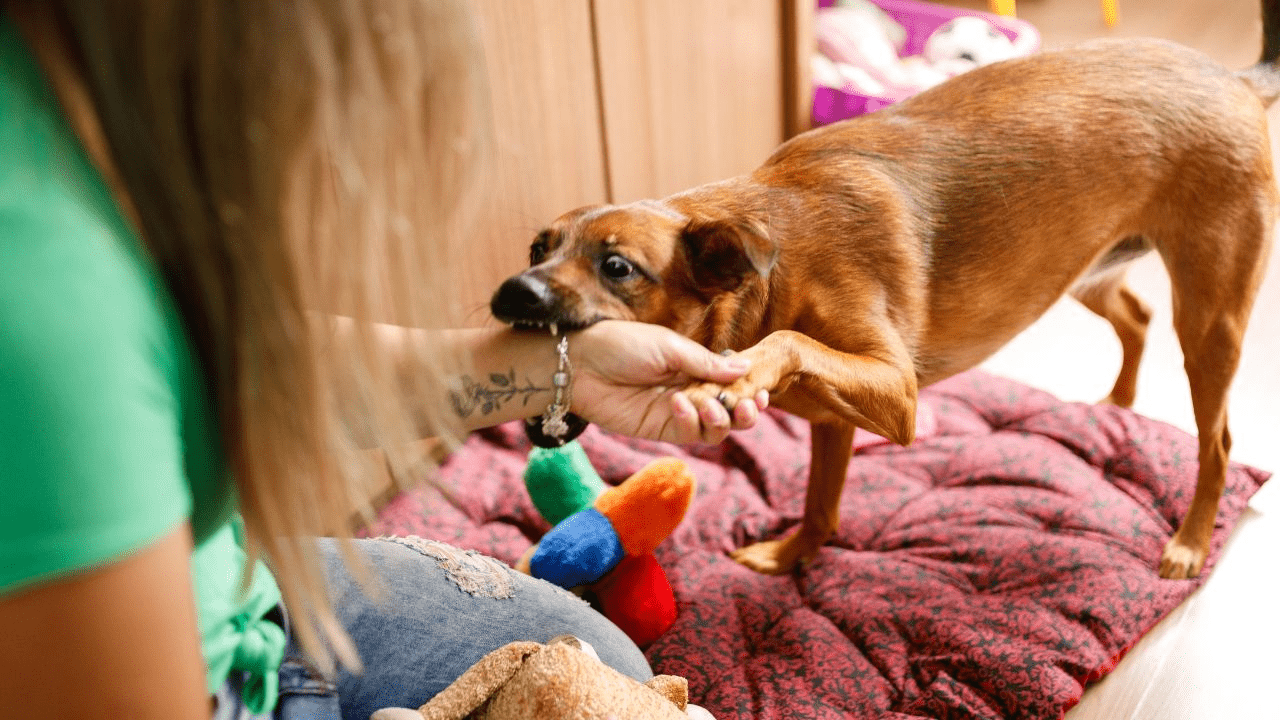
It’s natural for dogs to get excited and want to express their joy by biting
However, as an owner, learning how to stop your dog from biting when excited is essential.
Our automatic responses are not always the best ones.
This reaction frequently occurs during training when you want to squeal or lash out after being bit or nipped.
To a dog, making a loud noise is not discouraging; it is a form of communication.
Physical contact with your dog is never a good idea because it instills fear rather than trust in them.
It’s crucial to show kids what to do instead of rewarding their negative behavior, even unintentionally.
Dogs enjoy knowing that they are making their owners happy.
They simply are unable to always determine precisely what human reactions signify.
Instead, train your dog with one of these seven easy methods.
That will keep both you and your dog safe and healthy.
Stay Calm
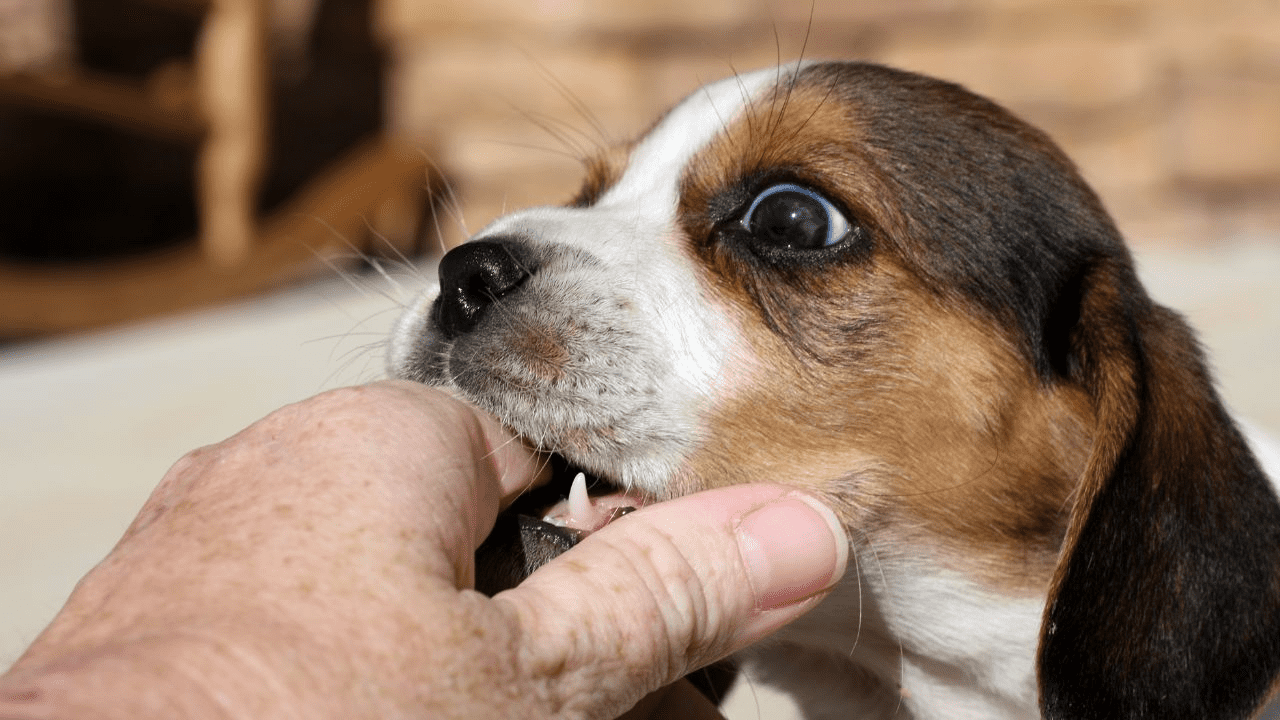
When a dog is excited, it’s essential to stay calm and provide a calming environment for your pet.
Speak softly, avoid sudden movements, and don’t get frustrated if your dog continues to bite.
Compare your attitude to being calm and gentle versus your hyper attitude.
Even if it hurts, resist the urge to react to the dog.
Till the puppies are clear, refrain from giving them any kind of attention, positive or negative.
Reward them with attention and perhaps even treat them when they focus enough to sit.
Reward them for remaining motionless even if they are too young to understand what “sit” means.
By staying calm, you can better control the situation and help your pup learn that biting isn’t the correct response in this situation.
Provide Positive Reinforcement
Rewarding good behavior can help encourage future desirable behaviors and can deter inappropriate ones.
Positive reinforcement is a great way to teach your dog that biting isn’t the appropriate response when feeling excited.
When your pup displays desired behavior, such as not biting, provide positive reinforcement with treats or verbal praise.
Redirection Technique
If you notice your dog getting too excited about its sound, try redirecting its attention to an appropriate activity like walking or playing a game of fetch.
That will give your dog something else to focus on and give it an outlet for its energy, which will help reduce the urge to bite out of excitement.
Exercise Your Dog Daily
Dogs who nip are frequently overstimulated dogs.
If your dog doesn’t receive enough exercise throughout the day, all that stored energy may manifest itself negatively, such as play biting.
Try adding more or extending your dog’s daily walks if they have too much power.
Exercise is essential in keeping your dog healthy, happy, and well-behaved.
Make sure to give your pup plenty of time to run around each day, so they have an outlet for their energy rather than using it on biting when excited.
Taking them for long walks or playing fetch are great ways to tire out your pup before they become too excited.
Walks are an excellent form of exercise and mental stimulation for your dog.
When they go outside, they will experience various exciting sights and noises, and they might even have the opportunity to interact with other canines.
Your dog is less likely to discontinue agitated behaviors, like nipping when thrilled, if they spend most of their mental and physical energy on walks.
Offer A Chew Toy
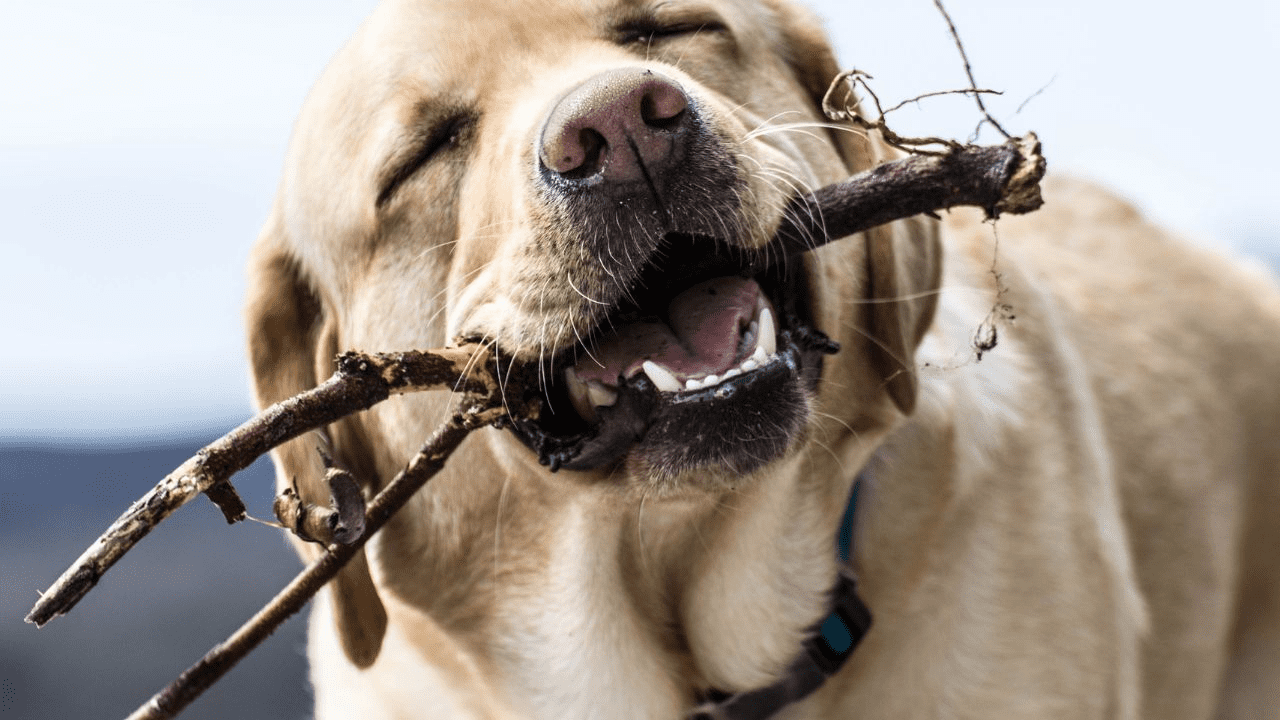
A great way to redirect your dog’s biting behavior is to provide them with a chew toy.
That gives them an alternative outlet for energy that won’t result in biting and should be used whenever your pup gets too excited.
Make sure your dog has enough chew toys if they are experiencing teething problems or anxiety and use their nibbling as a kind of self-soothing.
When they begin biting at you, do not reward them with the chew toys because this would appear to be a reward for their misbehavior.
When outsiders enter, having the toys nearby could cause them to turn away from you and toward the chew toy.
Toss Food On The Floor
That is how you get away from most of your overexcited canine buddies, known as a “treat scatter” in the shelter world.
Scattered the sweets on the ground after taking a fistful.
Most dogs will relax after giving the treats a sniff and collecting them.
Rewarding the dog for jumping up isn’t something you need to worry about too much because he’s probably too excited to learn right now.
He isn’t now using his prefrontal cortex to use science language!
Try a different approach if the dog refuses the goodies or resumes nipping.
He will become more composed after eating, at which point you can begin your lesson.
After this, dogs are typically less likely to “rebound” at you.
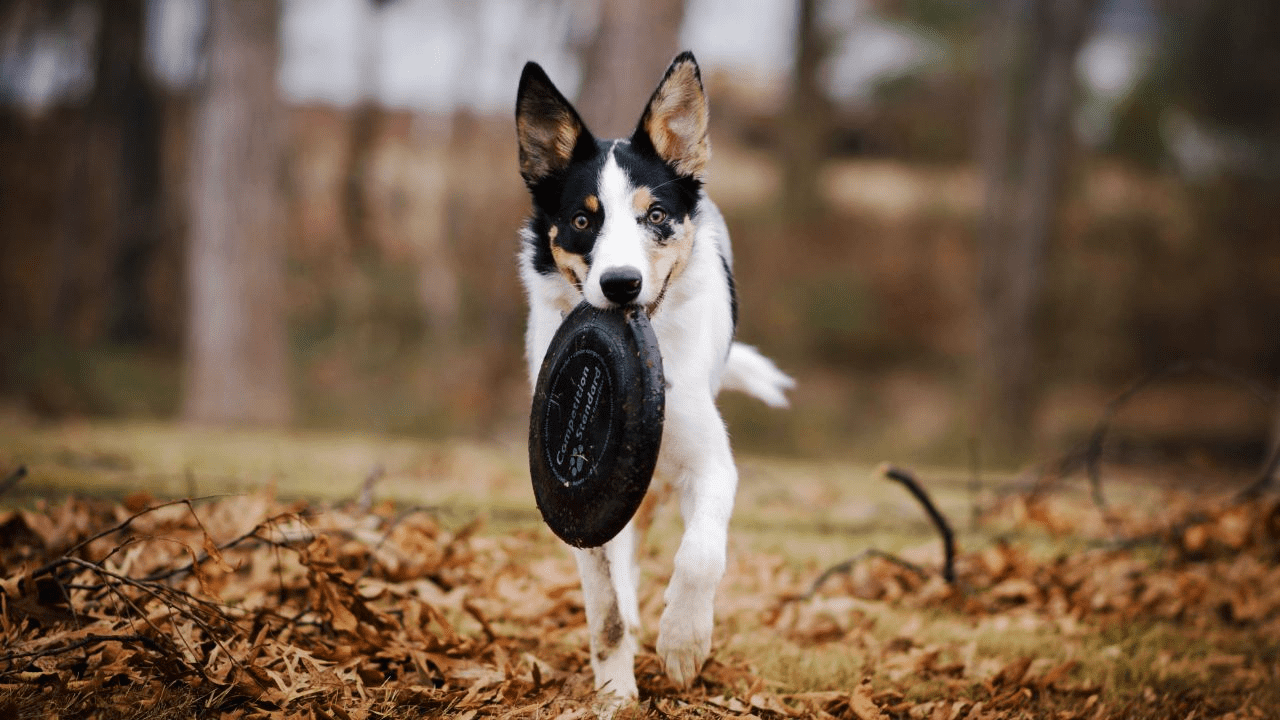
Put Your Dog In A Time-Out Area To Calm Down
If your dog continues to bite when excited, try putting them in a time-out area, such as the bathroom or another room, where they can calm down away from you and other people.
That will give them the space to relax and hopefully forget about the excitement, making them want to bite.
Ignore Your Dog When Biting
Ignoring your dog when they bite is a great way to stop them from continuing the behavior.
Your mere presence can be enough of a reward even if you don’t talk to them, pet them, or even acknowledge them while they jump all over you and nip if they misbehave after you have tried to enter their space while remaining calm, step back out and leave.
That might involve walking away without saying goodbye after a while, closing the door, or stepping back over a railing. Reward them as soon as they’ve calmed down to help them learn appropriate behavior.
Say “Ouch!” When Your Dog Bites
Another practical trick for stopping your dog from biting is to say “Ouch!” when they do it.
That will surprise and startle your pup, reminding them that their bite hurts and can give you time to take further steps for prevention.
Offer A Treat For Good Behavior
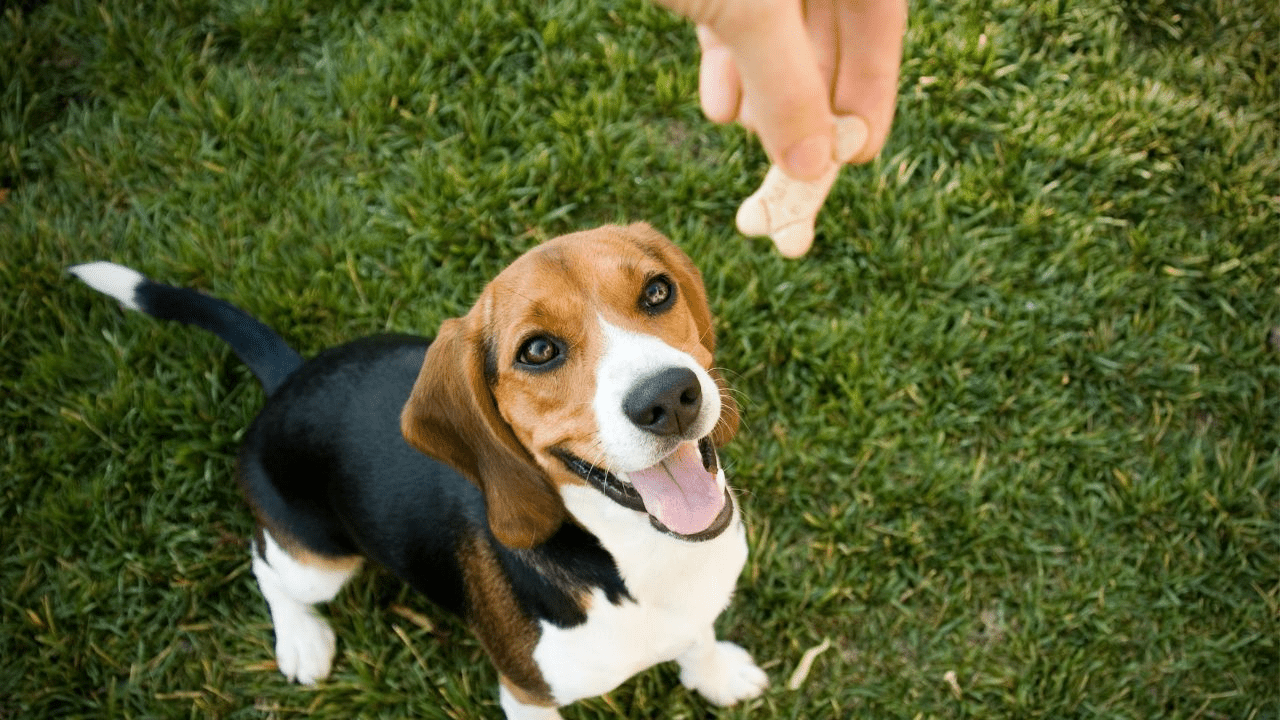
Rewarding good behavior with treats or praise is a great way to teach your dog what behaviors you want them to perform and which ones you don’t.
If your pup is getting too excited and biting, try offering them a treat or some verbal praise when they stop and stay calm.
Wear Gloves With A Taste Deterrent
If your dog continues to bite when excited, wearing gloves with a taste deterrent can help to discourage the behavior.
These gloves are usually made of plastic or vinyl and have a bittering agent added that will make them taste bad if your pup decides to take a bite.
Keep Your Dog On A Leash
Keeping your dog on a leash when outside is an important safety measure that can help reduce their biting behavior when excited.
That will let you keep control of the situation if your pup gets too excited and prevent them from getting away before you can take the necessary steps to stop their biting.
Leave The Room
Leaving the room is essential when a dog starts to bite out of excitement.
It gives the dog space to calm down and hopefully stops the behavior.
Be firm with this and ensure you always return once the dog has calmed down.
That will help to establish that you are in charge and that you expect the dog to behave in a certain way.
Using these tips, you can help your dog learn how to stop biting when excited and keep everyone safe.
Remember to stay calm, provide plenty of exercises, offer a chew toy, put your dog in a time-out area to calm down, ignore your pup when they bite, say “Ouch!” if they do it, reward good behavior with treats or praise, wear gloves with a taste deterrent and keep your pet on a leash when outside.
By doing all of these things together, you should be able to stop your dog from biting when excited in no time.
If it doesn’t help, and even adult dogs don’t stop with biting, getting help from a certified professional dog trainer can help your dog to learn bite inhibition.
Why Do Dogs Bite When Excited?
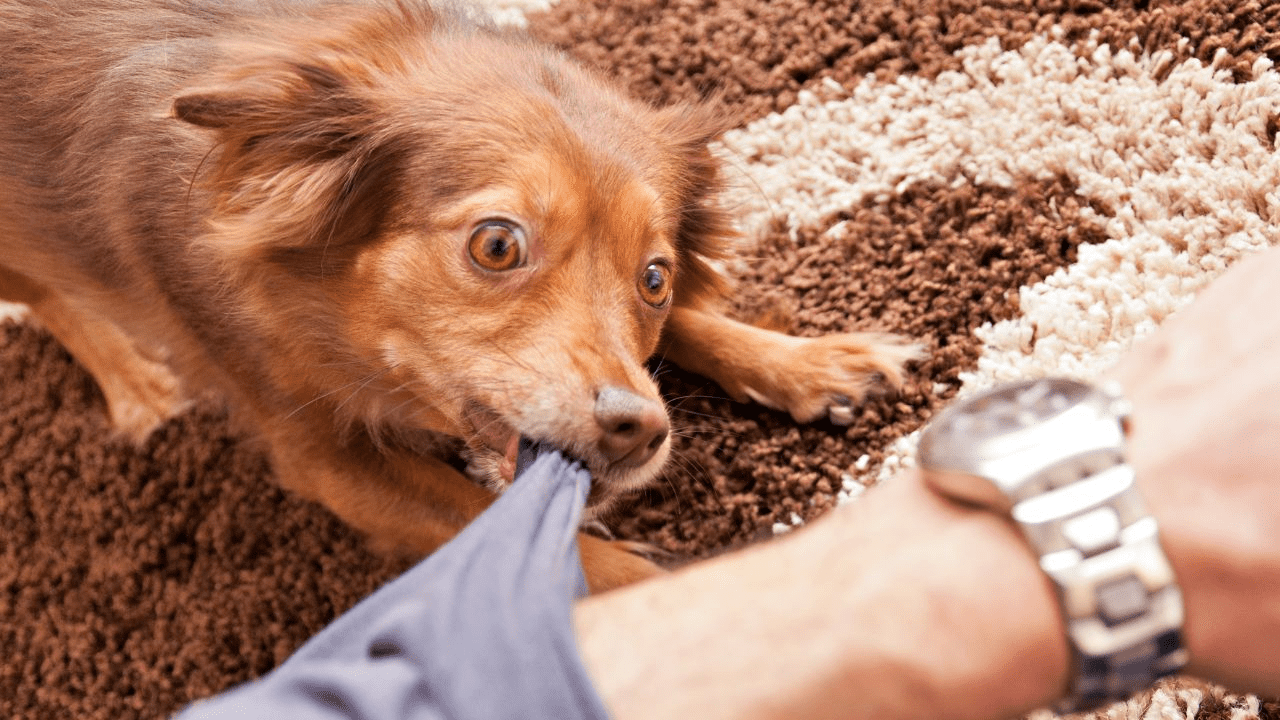
For better or worse, dogs use their lips to explore their surroundings.
This ends in a dog nipping when excited.
When he’s aroused, your dog nips you (even it’s an adult dog) because:
Your hands or feet are nearest to him, so he wants to play by placing something in his mouth.
Your hands and feet move the fastest as he attempts to play by putting something in his mouth.
He has discovered that biting causes you to squeal or move more quickly.
He also thought you might enjoy it because he enjoys jaw-wrestling with his canine companions!
Dogs who nip when they are excited are typically highly aroused.
That is a concise way of explaining that these dogs quickly become overly enthused about things.
These canines frequently retaliate by barking, spinning, and, you guessed it, biting.
What Not To Do When Dogs Nip
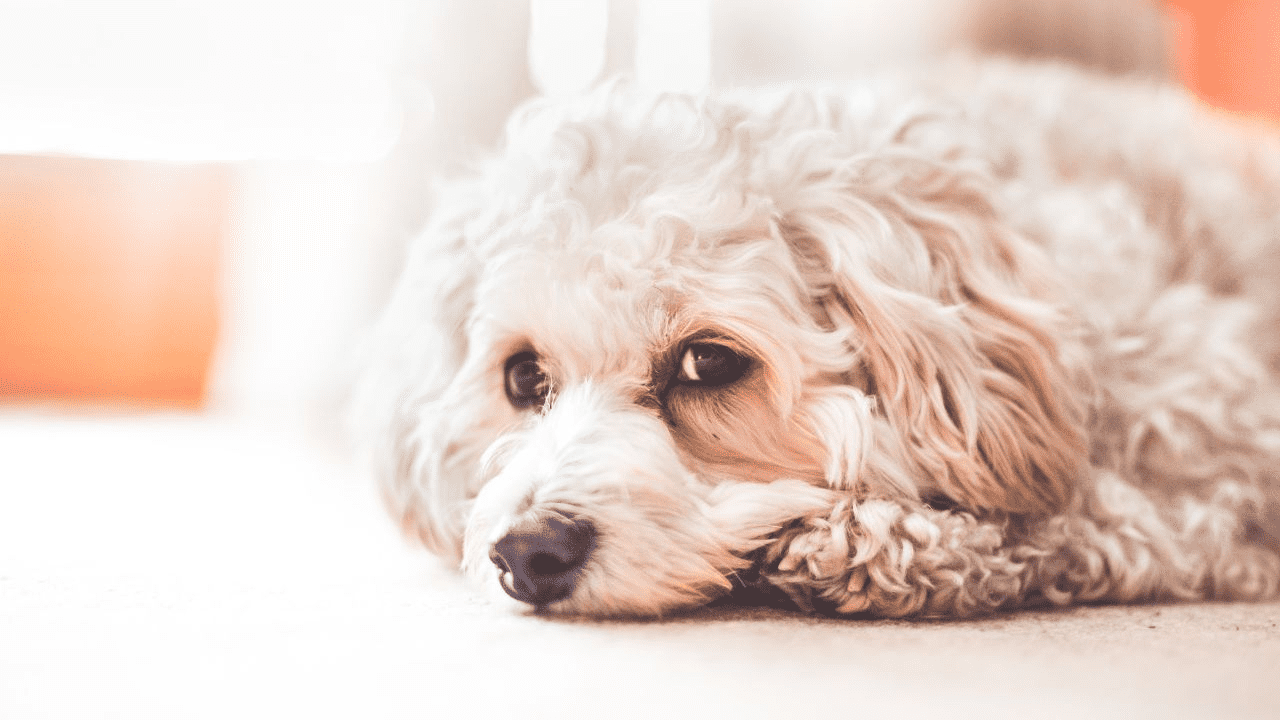
When a dog is biting out of excitement, it is important not to respond in a way that will only make the situation worse. Some key things not to do include:
Yell At Them
Making loud noises at your dog sometimes does not resemble words or even pain cries.
Because your squeals mimic their barks and noises, it may encourage them.
They may believe you are prepared to start playing right back to them.
Although it may be challenging when they begin biting as soon as you enter, you must not even acknowledge them verbally.
Placing The Dog In A Fetal Position (An Alpha Roll)
Using outdated science, traditional dog trainers held the mistaken belief that alpha rolls, in which one wolf throws another wolf onto its back, demonstrate dominance.
When afraid, submissive wolves lay over on their own.
In conclusion, the alpha roll is a reasonably old technique.
If you pin your dog to the ground, he might not bite you now or in the future, but only because he is afraid of you.
You want the best buddy, not a hostage; we’re pretty confident!
Try teaching your dog new ways to get excited and ways to calm down instead of enforcing your rules with frightening or violent tactics.
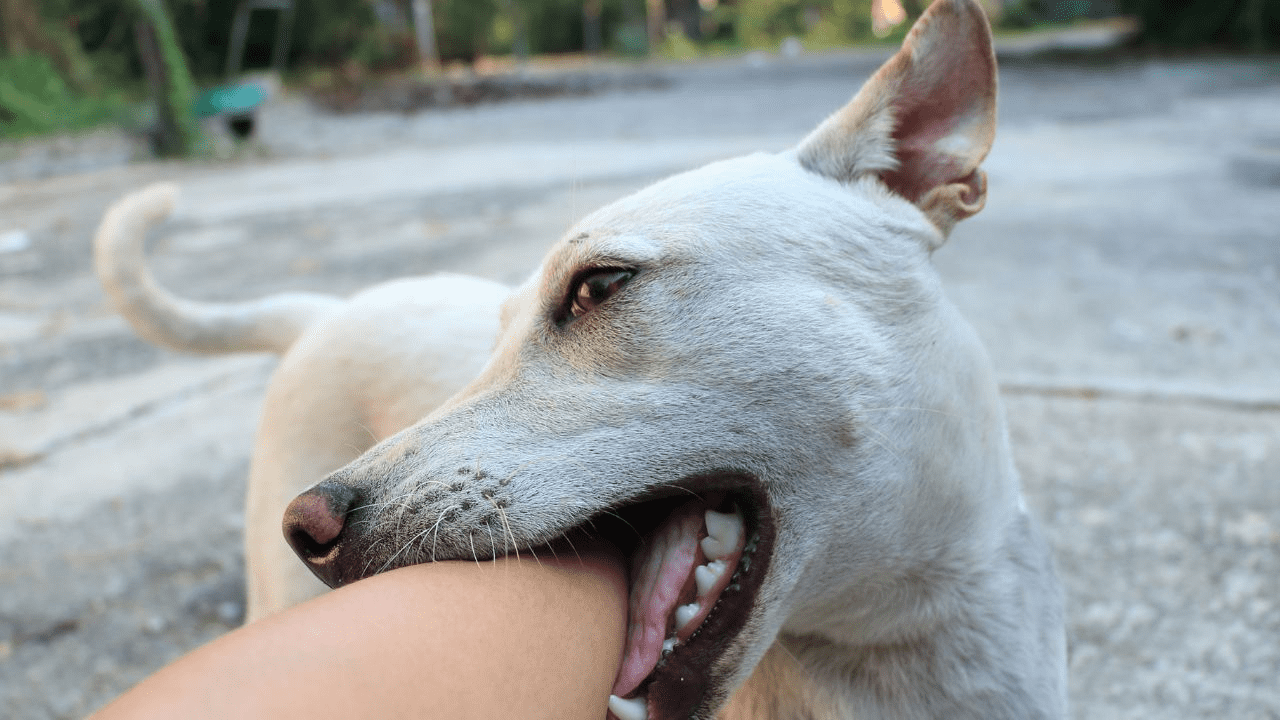
Water, Vinegar, Citronella, Or Just Spray Anything Else To The Dog
People who want to see results quickly frequently propose these techniques since they are effective.
Your dog, however, finds it to be pretty uncomfortable.
While it could prevent your dog from biting in the time, it will educate him to associate you (or visitors) with pain or dread.
That can trigger future lunging, barking, or hiding behaviors.
Not useful Instead of showing panic, we prefer a calm and courteous demeanor.
Keep Their Mouth Closed
Dogs do not enjoy having a hand placed over their muzzle, just as no one enjoys having their lips covered.
Aggressive dogs may feel tempted to lash out in response to the discomfort.
When someone approaches pet a more timid animal, they may run away or lash out in fear of the person’s hands being close to their face.
Throwing Objects At The Dog Or Shaking Pennies
This technique, like spraying the dog, is popular since it immediately ceases undesirable behavior.
Similar to spraying or rolling the dog, these techniques scare your dog and don’t teach him what to do in place of biting.
I’ve known dogs whose owners repeatedly shook cans of pennies at them to the point where the dogs began to grumble and bark whenever someone picked up a can-like object.
These dogs were eventually sent to a shelter (such as a water bottle).
Before You Go…
Now you know the answer to the question, “How to stop my dog from biting when excited?”.
If you want to learn more, read the following articles too!

